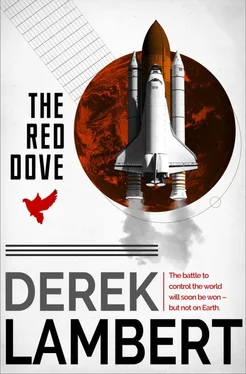‘From the top of the deck or the bottom?’
‘From the middle,’ Reynolds said.
‘When do you figure we can expect our spectacular?’
Reynolds sipped his coffee and shrugged. ‘It depends on Massey and the Soviet authorities. Hopefully they might put Dove II into orbit in about ten weeks because over-eagerness has always been their problem. Our problem is to maintain Massey’s credibility for as long as that.’
And my problem, he thought, is to keep the Congressional inquiry into the CIA guessing – for the same period of time.
That day the President of the Soviet Union held two audiences in his sprawling apartment at 26 Kutuzovsky Prospect, near the Ukraina Hotel. One with a soldier, one with a spy.
To the soldier, Grigori Tarkovsky, his winter-faced Minister of Defence, the President advised caution.
The President sat at his desk in his study on which stood photographs of his wife, a grey-haired, homely woman rarely seen in public, his three children and his two grandchildren; all were on vacation by the Black Sea.
Tarkovsky sat opposite him in a deep brocade armchair in which he vainly tried to maintain an upright, military posture. Like the armchair, the rest of the furniture in the apartment was dark and solid, more comfortable and reassuring, the President felt, than the Finnish rubbish that Vlasov imported into his home two floors below.
Tarkovsky had brought with him a red dossier containing his proposals relating to the fleet of Dove shuttles and their role in containing (Tarkovsky’s own euphemism) American expansionism in space.
The President flipped through the pages, twenty-five of them; at least Tarkovsky’s impetuosity had been retarded to that extent. He tapped the dossier and said: ‘This is roughly as you explained it to me over the chess board?’
Tarkovsky nodded. ‘Only in more detail.’
‘And you haven’t discussed it with anyone?’
‘No one, Comrade President.’
‘I didn’t know you could type, Grigori,’ opening the dossier at a typewritten page.
‘Very badly, as you can see. But I take your point – it wasn’t seen by a secretary.’
‘Did you make a rough copy?’
‘And destroyed it.’
The President scanned a page. ‘You seem to have acquired a great deal of esoteric knowledge about spaceships.’
‘I repeat, Comrade President, that I have not discussed the project with anyone. But I am Minister of Defence and I have made it my business to study these matters.’
The President had little doubt that Tarkovsky had imparted his inspiration to others because discretion wasn’t his strong suit. (How little, the President thought, the public knows about our frailties when they see us as implacable as statues watching the parades on Red Square.) What’s more, he had most probably implemented some of his suggestions; but there was no way he could put them into practice until the shuttles were ready to orbit. For the sake of Mankind the President hoped that Vlasov’s scheme involving the American Massey bore fruit first.
He stood up and walked to the silver samovar in the corner of the room. His movements felt clumsy; tomorrow he was due for a check-up at the Kremlin Clinic. He poured tea, sharpened it with lemon and looked inquiringly at Tarkovsky thinking: ‘Once upon a time we would have argued over a carafe of vodka.’ But the President’s doctors had told him to cut down drastically on alcohol.
Tarkovsky waved away the invitation and said: ‘As I’ve said before the final battle will be fought in space. But the bases for the troops and guns of space will be on earth, at least to begin with. So to win the battle, the war, we have to destroy those enemy bases. To the best of my knowledge there are five such locations from which the Americans could operate.’
The President put his cup and saucer on the desk and sat down. Staring at the snow pouring past the window behind Tarkovsky, he began to count them on his fingers. ‘Houston, Kennedy, Vandenberg…’ He paused. ‘Wallops Flight Center off the Virginian coast?’ looking at Tarkovsky for confirmation; but after Tarkovsky, impressed, had nodded he ran out of bases; and he had memorised them only a few minutes before Tarkovsky’s arrival!
‘And White Sands, New Mexico,’ Tarkovsky said. ‘For short range vertical flights and sounding rockets. Knock out all five in one limited nuclear attack and you have the United States at your mercy.’
The President said: ‘I don’t have to remind you that we’re talking about a deterrent not unprovoked aggression.’
‘And I don’t have to remind you, Comrade President, that at this moment the Americans are pushing ahead with plans to dominate space. If they succeed they would be in a position to knock out our bases – Baikonur, Kapustin Yar, Saryshagan, Plesetsk…’
‘But a deterrent nevertheless.’
‘Depending on the circumstances.’
The President, appreciating that he was dealing with that most dangerous of phenomena, old age seeking a climactic exit, said: ‘But you mustn’t be impetuous, Grigori. After all, the Politburo would have to authorise any action you took.’
Or would it? Presented with a successful fait accompli the Politburo, and the Presidium for that matter, would doubtless greet Tarkovsky’s pre-emptive strike as masterly anticipation.
And I would be relegated to the role of unenterprising reactionary.
Until the Apocalypse occurred.
Then I might be re-instated. But too late.
We are all old men, he thought and to Tarkovsky he said: ‘Very well, Grigori, I accept that what you say might be right. But first we have to try other alternatives.’
‘Such as?’
‘That needn’t concern you. But if I hear that you are making any moves without higher authority then you will be disciplined.’
Tarkovsky said: ‘With respect, what intrigues me is the other alternatives’
‘I told you – forget them.’
‘How can I if they’re opposed to my proposals?’
From the depths of the armchair the old war lord’s strength reached the President. He did, after all, command forces numbering more than three and a half million. Nevertheless, of those 100,000 were zampolit, political officers under the direction of Nicolay Vlasov.
The President said: ‘I’m ordering you to forget them. Or not to consider them, rather. I promise you, Grigori, that if the alternatives don’t prove practical then I shall advise the Politburo to implement your proposals – as a deterrent.’
‘Very well.’ Tarkovsky shrugged. ‘We have known each other a long time. I have learned to trust you.’
But I have not learned the same about you.
Tarkovsky said: ‘Whatever happens I can assure you that the forces of the Warsaw Pact countries will be behind us…’
As they should be, without any assurances from the Soviet Minister of Defence. The President said: ‘For God’s sake, Grigori, stop addressing the troops,’ reflecting that, in moments of stress, Russian atheists still invoked a Christian deity.
‘Then I have your promise that, if the alternatives,’ his voice stiff with reproach, ‘don’t prove to be acceptable, you will recommend my proposal?’
Looking at Tarkovsky through the steam rising from his lemon tea, the President said: ‘I don’t have to promise you anything, Grigori.’
To the spy, Nicolay Vlasov, his urbane secret service chief, the President urged speed.
If the coup suggested by Robert Massey was feasible then there was still hope.
The trouble was that the President didn’t trust Vlasov. In fact he sometimes wondered if the KGB Chairman had ever authorised his agents to plant microphones in the apartment in which they were now sitting because it would surely be the easiest thing in the world to deposit bugs when you were pretending to search for them.
Читать дальше
Конец ознакомительного отрывка
Купить книгу












